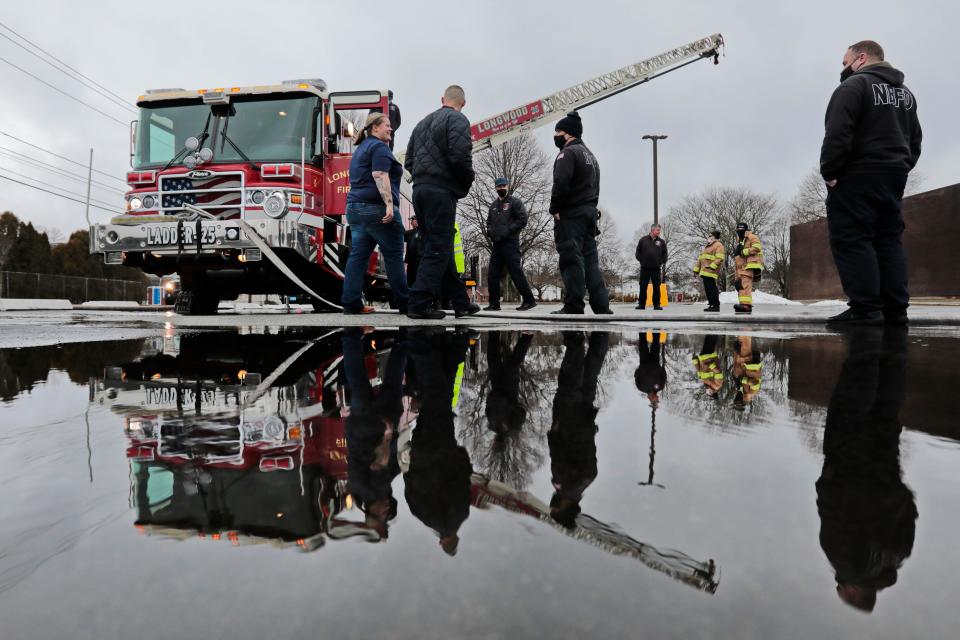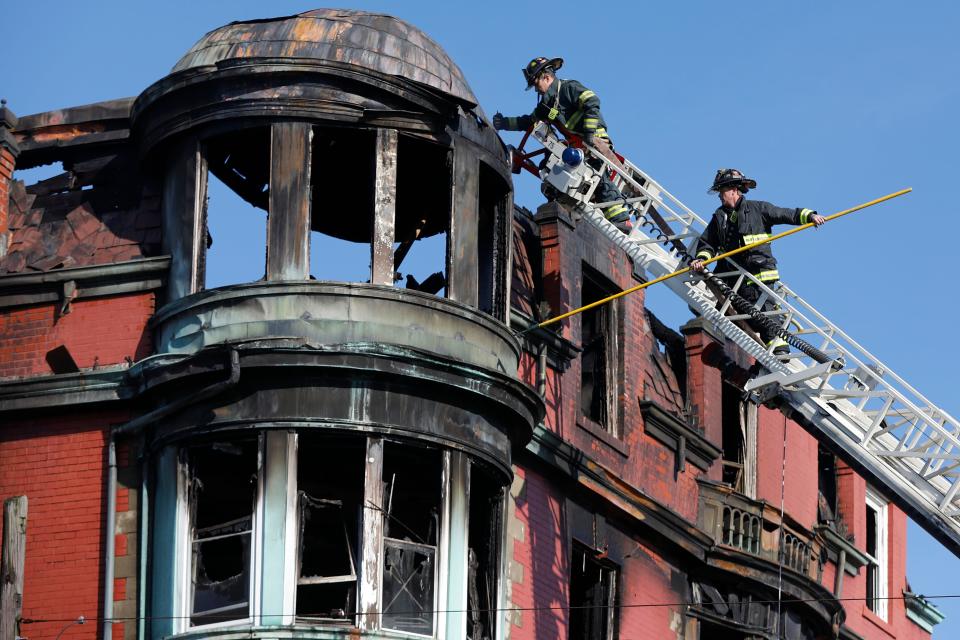Firefighting is tough. Here's how New Bedford FD helps its members deal with tragedy.
NEW BEDFORD — When firefighters enter a home during an emergency response, there are set, written protocols to follow, checks to perform, boxes to check. And then there are some protocols that are more personal, more internal in nature.
"When I'm going into somebody's house, I try to not look at their pictures," New Bedford Fire Chief Scott Kruger said. "Most of those times are all happy times — family reunions, gatherings, kids, pets — and I don't want to identify with that. Sometimes that's the last time that person is going to be in that home.
"You learn to block out those things, because if you don't, you're going to think about them."
While the possibility of encountering death regularly is something one accepts when entering into the field, Kruger says, there are still those days that are more difficult than others.
"I always say on any of these jobs — fire, EMS, police — sometimes it just feels like it's a front row seat to watch people die," Kruger said. "But sometimes there are those incidents that are especially graphic, or are just on another level."
Sometimes, the traumas are attached to high-profile incidents such as the March fire at the Royal Crown rooming house on Acushnet Avenue. Other times, they stem from the everyday incidents less likely to make headlines. But in any and all cases, according to Kruger and New Bedford firefighter/CISM (Critical Incident Stress Management) team member Lance Brightman, the department wants all its members to know there's nothing wrong with admitting when something has shaken them.
Stay up on summer happenings: New Bedford's Feast of the Blessed Sacrament returns Aug. 3-6. What to know before you go
In fact, if they want longevity on the job, with their mental health intact, it may be imperative.
"It builds up over time," Brightman said of the trauma firefighters regularly encounter. "And that's what we're trying to prevent."

What happens when firefighters see too much?
At the New Bedford Fire Department, CISM is a department-run program where some department members voluntarily double as peer counselors, of sorts, making it so firefighters always have someone to talk to about anything on their mind.
After certain incidents, such as the Royal Crown fire, or the fatal 260 Chestnut St. fire less than a month later in April, there are protocols which call for a CISM debriefing involving everyone who responded to the scene. In these cases, Kruger and Brightman said, the debriefings take on a more formalized approach and involve visits from the fire chaplain and a psychiatric clinician.
"There were probably around 30 that came to that meeting," Kruger said of the post-Royal Crown debriefing which took place days after the March 28 fire. Kruger says that fire, which resulted in two deaths despite crews' efforts, is an example of the type of incident likely to leave first responders with the haunting question: What could I have done differently?
"It's helpful when you look at an event from 30 different people's perspectives and you see how differently everybody saw it — how it unfolded, how it affected them. It kind of gives you an understanding of what actually went on," Kruger said. "Sometimes you're so hyper-focused on your small role, when you piece it all together, it kind of brings you a lot of understanding of what you're psychologically dealing with."
Need something to do? Check this out: Free things to do with the kids on the SouthCoast
"When the crew gets back to the station, sometimes these guys are just waiting," Brightman said of CISM activations. "It's more of a formal debriefing where everyone will sit down and talk about what just happened."
Other times, the help takes on a more personalized form based on an individual's needs.
"If you just want to talk to another firefighter and you're good, we can do that. If you want to talk to somebody professionally, or if you feel you're at a point you need to go away, we can do that," said Brightman, noting there are multiple psychiatric locations one can be referred to, including one run by the International Association of Firefighters in Virginia reserved for those in the field. "Forty-eight to 72 hours after the fact, when you've collected yourself, some of the things you've been second-guessing yourself on, you realize it wasn't the way you perceived it."
Making of a CISM firefighter
When Brightman joined the NBFD in 2007, he learned how harsh the reality of the job can be on his very first call, dealing with an infant death.
"I can still picture everything about that kid," Brightman said. "When I got back to the first station, my first instinct was to call my wife. My daughter was a baby at the time, about the same age. I said you gotta bring her. I need to hold her.
"But we also had a couple guys come around and talk to me and I thought this is great that they have this because I didn’t know who to talk to."
With that early experience, which Brightman says was instrumental in keeping his mental health well at the start of his career, he was inspired to become a CISM team member himself, noting the program has grown multi-fold since then.
"I used the service, it helped me tremendously. That’s what made me want to do this," he said. "I probably wouldn’t be sitting here right now if I kept going down the rabbit hole.... Your mind plays tricks on you after a while."
A shift of mentality
As dangerous as the job is, studies continue to find firefighters are more likely to die from suicide than from work hazards during a response. Kruger and Brightman say fortunately, mindsets within the field are now catching up to the reality of the job, with an emphasis on first responders' mental health becoming more well-pronounced starting about 10 years ago.

"When I came on in '91 working with New Bedford EMS, it didn't really exist to the level it does now," Kruger said of CISM and like-programming. "Back then a lot of it was, hey, if you couldn't deal it, you weren't tough enough."
As such, the idea of first responders needing services like CISM wasn't exactly universally accepted initially, Brightman said.
"Pretty much in all civil service there's kind of an alpha male, machismo type of thing," he said. "But there's been a big shift in understanding that just because you need to talk to somebody, it does not in any way degrade you or make you look weak, or like there's something wrong with you.
"It's becoming more prevalent that people are understanding that."
"Substance abuse, divorce rates, suicide, all of those things — there's reasons why they happen and a lot of them have to do with what you see and what you deal with on this job," Kruger said.
In the wake of tragedy: After a devastating fire, New Bedford is cracking down on rooming houses. Here's how.
Involving the family
Regardless of how tight-knit a fire company can be, sometimes there's no substitute for actual family, both Kruger and Brightman agreed. That's why this past spring, the department tried out an NBFD first: a social event for the spouses of firefighters.
"It doesn't stop with firefighters," Brightman said of CISM programming. "Spouses, children, anyone in the household, we will absolutely help them."
Brightman said the first-time event was an idea to raise awareness within the NBFD community that family support is available for them, too. Brightman and Kruger said coming up with ways to continue raising that awareness is something the department will be thinking about.
This article originally appeared on Standard-Times: 'It helped me tremendously': How CISM helps New Bedford firefighters

